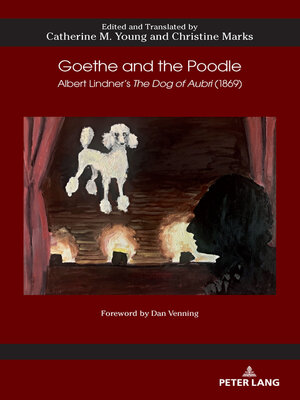Goethe and the Poodle
ebook ∣ Albert Lindner's The Dog of Aubri · German Studies In America
By Gail Hart

Sign up to save your library
With an OverDrive account, you can save your favorite libraries for at-a-glance information about availability. Find out more about OverDrive accounts.
Find this title in Libby, the library reading app by OverDrive.



Search for a digital library with this title
Title found at these libraries:
| Library Name | Distance |
|---|---|
| Loading... |
"This superbly compiled and provocative edition makes available for the first time in English translation Albert Lindner's metatheatrical play on the canine conflict that disrupted Goethe's Weimar Classicism with melodramatic sensation to herald modernism. The critical apparatus offers a rich historiographical frame for reading diegetic animals in performance, while images of primary documents help vivify the context. Thus framed and honed with two staged readings, the German- and English-language play texts raise intriguing questions about des Pudels Kern, the absent/present poodle's core meaning. Faustian allusions evoke disturbing dynamics of white patriarchy amid complex intersections of political and theatrical autocracies that resound to the present day."
– Professor Kim Marra, University of Iowa
"In Goethe and the Poodle, you get not only an extraordinary play but, also, extraordinary history. Young and Marks make Lindner's nineteenth-century play accessible, bringing out its humor and its theatricality. In the introduction and footnotes, they use the play to teach the reader about the sweep of nineteenth-century German theater, from Goethe and French melodrama through to unified Germany. The book is eminently teachable, in German as well as English, and very entertaining."
– Professor Matt Cornish, Ohio University
Goethe and the Poodle is the first English translation of scholar Albert Lindner's 1869 play Der Hund des Aubri, which premiered at Berlin's Wallner Theater during the German Wars of Unification. Inspired by actual events, Lindner's eccentric play stages the conspiracy to bring a popular melodrama featuring a trained poodle to the Weimar Court theater in 1817, Johann Wolfgang von Goethe's resistance to the performance, and his subsequent departure after leading the theater for 26 years. Thorough annotations explain the play's cultural and geographic references, and the introductory essay analyzes aesthetic debates surrounding Weimar Classicism, popular taste, and animal performance. Archival images including playbills, portraits, and the 1812 Weimar Theater Laws supplement the volume's contributions to theater history.







